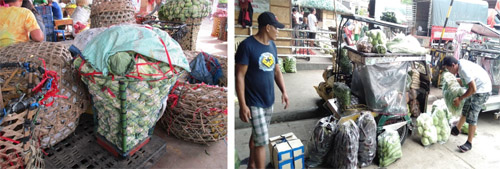Project to address food security issues in PH via improvement of vegetable value chain begins
2022.01.21
The COVID-19 pandemic and vulnerability to natural disasters highlighted the urgency to further boost the Philippines' food security.
Said challenges caused bottlenecks in the country's supply chain and sparked food shortages and hike in food prices due to transport and frequent lockdowns. With these, the Department of Agriculture (DA) and the Japan International Cooperation Agency (JICA) kicked off recently the first phase of a technical cooperation project that seeks to study the gaps in the country's vegetable supply chain network, address food security, and help raise the income of farmers.
The Project for Market-Driven Enhancement for Vegetable Value Chain in the Philippines (MV2C-TCP) is a five-year initiative which will be piloted in major production areas for highland and lowland vegetables. One of the project's outcomes is the vegetable value chain roadmap outlining challenges, solutions, and stakeholder roles seen to benefit all of vegetable-producing regions in the country.
"The pandemic and recently, natural disasters, serve as wake up call to look for opportunities to improve food security and the food value chain network," said OHSHIMA Ayumu, JICA Senior Representative. "We've seen how food inaccessibility not only led to hunger in vulnerable groups but also affected the income of farmers whose produce were not able to reach more markets."
The Food and Agriculture Organization (FAO) reported that the pandemic and its related restriction measures have aggravated the lingering challenges faced by the Philippine agriculture sector such as low farmers' income and disconnected value chain. The report also said that COVID-19 is likely to result in reduced production and food inaccessibility.
In 2020, the Philippine agriculture sector made up 10.2% of the country's GDP and employed 9.75 million workers based on Philippine Statistics Authority (PSA) data. Government data also shows that some 7.9 million hectares of Philippine lands is devoted to agriculture. Unfortunately, based on the Global Hunger Index, the country is ranked 68th out of 116 countries surveyed in terms of hunger level which could further be exacerbated by climate change patterns and evolving pandemic.
"JICA believes this is a timely cooperation as we map the roles of every stakeholder in the agriculture sector and firm up solutions to tackle food security and identify opportunities to support small-scale farmers," added Ohshima.
The JICA-DA cooperation includes market survey and value chain survey as well as training of Filipinos in Japan on new technology and farm administration practices.
Aside from technical cooperation, JICA has been supporting the Philippine agriculture sector since the 1960s through building basic rural infrastructure such as farm-to-market roads, post-harvest facilities, and irrigation systems in agrarian reform communities.

Agricultural terminals in Cebu (left) and Quezon (right) depicting current issues in the Philippine vegetable value chain.
scroll